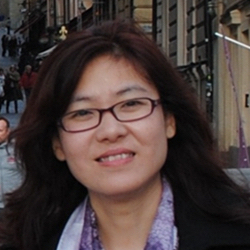HICSS - 52 Digital Government Track
52nd Hawaii International Conference on System Sciences
January 8-11, 2019 - Grand Wailea, Maui, HI, USA
Overview
Minitracks
Tutorials and Workshops
Other Links
Digital Social Innovation: Exploring Implications of the Digital Transformation on Society



Minitrack Description
Social Innovation is not new, but it has been recently gaining traction in policy and academic debates, benefiting from an increasing favorable environment for development and experimentation, especially in combination with technological and organizational innovation, and as a possible contribution to address dire societal challenges. In particular, Digital Social Innovation (DSI) emerged in the recent years as a growing phenomenon, impinging on the development or application of digital solutions based on emerging technologies, such as big and open data, low-cost open hardware, crowdsourcing, artificial intelligence, blockchain and Internet of Things (IoT) among others. By empowering citizens and engaging them in civic action, they provide new ways of building social movements, delivering public services and creating social impact in fields as diverse as education and training, governance and democracy, energy and environment, transport and housing, healthcare and social services.
Being at the crossroads between theory, practice and policy, DSI has a great potential to enable a new configuration or combination of social practices providing new or better answers to the needs of individuals throughout their lives, establishing new relationships, strengthening collaborations among stakeholders and fostering open processes of co-creation and public value allocation (Misuraca et al., 2015).
However, Digital Social Innovation is a 'quasi-concept', which in the broader literature, cannot be assigned to any paradigm within any single social science or epistemic community thus requires a multi-disciplinary approach to work out the relationship between social innovation and other types of innovations in order to contribute defining future research directions and identify policy implications.
At the same time, recognizing that ICTs are permeating any single aspect of human life, and we are at the beginning of a new industrial revolution, it is vital to better understand the social implications of the digital transformation on governance and society, both in terms of emerging behaviors in the labor markets underpinning the so called 'platform' economy, and the required modernization of welfare systems to address the changing nature of work and living in the digital world. This would need investigating the use of ICTs which is transforming the way we work, live and interact with one another, to address the challenges ahead for our governance systems and in turn achieve progress and well-being for citizens and society.
Areas of focus and interest include but are not limited to the following topics:
- Theoretical reflections on the nature and dimensions of social innovation and contributions on the debate on its relationships with other types of innovation, mainly technological, organizational and open innovation; as well as the debate on its role at the crossroads between private and public sector innovation;
- Discussion of Innovative practices to implement social innovation and related methodological approaches to assess impacts of social innovation policies and programs, including measuring social and public value generation;
- The role of Digital Social Innovation and the use of emerging technologies to improve design of policies and services, or as an answer to current and future societal challenges;
- The potential of innovative financial instruments, including social impact investing, to strengthen the resilience of social innovation ecosystems in a longer term perspective;
- Specific applications of Social Innovation on major challenges such as healthcare and active and healthy aging, and to services targeted at disadvantaged groups, including innovation in designing and implementing new social services to face new or unmet needs;
- Specific technological solutions to introduce innovative user-oriented approaches or new practices in existing processes, resulting in new forms and mechanisms of delivery, with a specific focus on co-design, co-production and co-provision of services;
- Case studies and analysis of social innovation practices where ICTs play a crucial role in promoting social investment, developing effective solutions to modernize welfare systems.
- Theoretical discussions and examples of applications of 'social credit systems' for developing community reputation mechanisms and their effects on citizens behaviors.
- The role of Social Innovation as catalyst to facilitate the operationalization of ´open innovation ecosystems´, facilitating the experimentation, development and emergence of new products, services and structures which may have, a beneficial effect on growth and wellbeing.
More information on the minitrack chairs:
Gianluca Misuraca is a Senior Scientist at the European Commission's Joint Research Centre where, since 2009, he is conducting research in the area of ICT for governance and social inclusion. Before joining the European Commission Gianluca was a Research Associate at the Ecole Polytechnique Fédérale de Lausanne (EPFL) where between 2005 and 2008 he has been the Managing Director of the Executive Master in eGovernance conducted by EPFL in collaboration with prestigious institutions worldwide. Gianluca's background is economics with focus on the interface between ICTs and public sector innovation. He holds a Diploma of Specialisation in European Union Economics and Law, and in Security Management, an Executive Master in eGovernance and a Ph. D in Management of Technology from EPFL. He is a recognised scholar with many publications in the field of Information Society development.
Christopher Tucci is a Professor of Management of Technology at the Ecole Polytechnique Fédérale de Lausanne (EPFL), Switzerland, where he holds the Chair in Corporate Strategy & Innovation. He received the Ph.D. in Management from the Sloan School of Management at the Massachusetts Institute of Technology. Before going back for his PhD, his prior work experience was as an industrial computer scientist at Ford Aerospace, where he was involved in developing Internet protocols in the 1980s. Dr. Tuccis primary area of interest is in technological change and how waves of technological changes influence entrant / incumbent dynamics. He is also studying how the technological changes brought about by the popularization of the Internet affect firms in different industries. He is the co-author of the books Nurturing Science-Based Ventures and Internet Business Models and Strategies, and has published articles in, among others, Academy of Management Review, Strategic Management Journal, Management Science, IEEE Transactions on Engineering Management, Research Policy, Communications of the ACM, Strategic Entrepreneurship Journal, and Journal of Product Innovation Management. Professor Tucci is the Technology & Innovation Management Department Editor for the IEEE Transactions on Engineering Management and on the Editorial Board of Organization Science.
Shuhua Monica Liu is currently an Associate Professor at the Department of Public Administration, Fudan University, Shanghai. She is also the Director of the Research Institute of Intelligent Complex Systems (RIICS) at Fudan University. Her current research projects focus on interdisciplinary applications of dynamic system analysis to the broad areas of technology innovation and risk management. Her areas of expertise include Innovative Technology and Emergency Management, Electronic Governance and Urban Management. She has coauthored a number of journal publications, conference articles and book chapters in the aforementioned topics, and has received several grants from various funding agencies including The United Nations Development Program, China National Social Science Foundation, China Ministry of Science and Technology, China Earth Administration and Shanghai Municipal Science and Technology Commission.
Co-Chairs
Gianluca Misuraca
(Primary Contact)
European Commission
Joint Research Centre
Seville, Spain
Email: Gianluca.Misuraca@ec.europa.eu
Christopher Tucci
College of Management of Technology
Ecole Polytechnique Fédérale de Lausanne (EPFL)
Phone: +41 21 69 30023
Email: christopher.tucci@epfl.ch
Shuhua Monica Liu
School of International Relations and Public Affairs
Fudan University
Shanghai
PR China
Email: Shuhua.monica.liu@gmail.com
